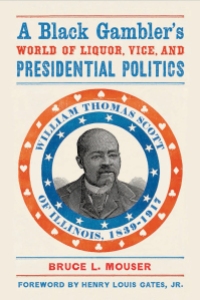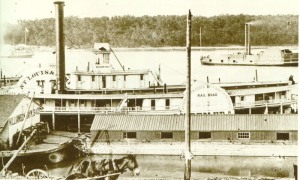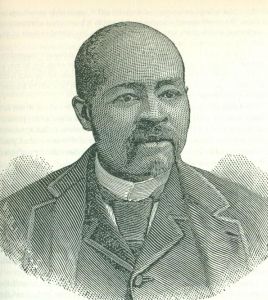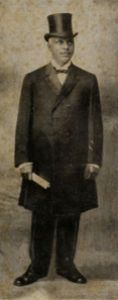WILLIAM THOMAS SCOTT was an entrepreneur and political activist from East Saint Louis and Cairo, Illinois, who in 1904 briefly became the first African American nominated by a national party for  president of the United States. He is alleged to have been one of the wealthiest African Americans in Illinois at the peak of his career.
president of the United States. He is alleged to have been one of the wealthiest African Americans in Illinois at the peak of his career.
A new book, A Black Gambler’s World of Liquor, Vice, and Presidential Politics: William Thomas Scott of Illinois, 1839–1917, by Bruce L. Mouser, is the first biography of Scott, whose story has been largely forgotten except in the Cairo area. The book is published by the University of Wisconsin Press and has a foreword by Harvard professor, author, and documentary filmmaker Henry Louis Gates, Jr.
Scott’s story is set in a time when Black Americans were experiencing enormous change. Born in Ohio in 1839, Scott was a free man before the Civil War. He joined the Union Navy in 1863 and served at Cairo, Illinois, the headquarters of Union Forces in the West during the Civil War. He saw the end of slavery and was already a political player when African Americans obtained the right to vote in 1870.
“The biography is a fascinating and informative look into the life of a forgotten but important African American leader who charted his own course from the Civil War to the eve of America’s entry into World War I,” says Roger Bridges, historian at Illinois State University.
“William Thomas Scott was a maverick who worked tirelessly to promote and advance the black community (while at the same time lining his own pockets in the sordid world of gambling, prostitution, and tavern-keeping). Scott emerges in Mouser’s biography as a powerful, interesting, and enigmatic leader working on both sides of the law to further his own interests and those of the larger African American community,” Bridges notes.
As Mouser discovered, Scott was a charismatic hustler who built his fortune in Illinois in the Cairo–East Saint Louis area through illegal liquor sales, gambling, and operating houses of ill repute. He also branched into legal businesses including hotels, saloons, and real estate. Eventually he became the publisher and editor of what may have been America’s first African American daily newspaper, the Cairo Gazette, and became active in politics.
“The post-Civil War era in the United States was a time of promise for African Americans, but in the late nineteenth and earlier twentieth centuries they lost ground with the rise of Jim Crow laws and scientific racism,” says the book’s author, Bruce Mouser. “William Scott struggled into the twentieth century to retain the progress made by African Americans.”
Scott was an outspoken advocate for equal rights. Like many in his era, he believed in political patronage and frequently led rebellions against political bosses who failed to deliver jobs and reforms in exchange for votes.
“Scott refused to be complicit in backing politicians who took him and the broader base of first-generation black voters for dupes,” notes Henry Louis Gates, Jr. “He saw the political game for what it was: a game of power.”
When nearly all voting Blacks were Republicans—the party of Abraham Lincoln—William Scott broke away to become a Democrat. In his journalism and speeches he encouraged Blacks to look beyond Lincoln’s party and cast their votes in support of their own economic interests and civil rights. Scott became disillusioned with Democrats of the era as well and helped build the National Negro Liberty Party (NNLP) to forward economic, political, and legal rights for his race.
Although arrested numerous times on charges related to bootleg liquor sales, gambling, and prostitution, Scott had remained a popular public speaker, journalist, and political power broker in Illinois. But the hustling that had brought him business success proved his undoing as a national political figure. Although he was the NNLP’s initial presidential nominee in 1904, revelations about his scandalous past forced him to step aside for another candidate.
The author of the biography, Bruce L. Mouser, is a retired professor of history at the University of Wisconsin–La Crosse. He first became aware of Scott’s story while he was writing a different book about another early African American journalist and politician, George Edwin Taylor.
“I had initially thought that George Edwin Taylor was the first African American nominated to run for president of the United States. Taylor was indeed the first to get on the ballot, but as I found out in my research, William Thomas Scott was actually the first nominee of the National Negro Liberty Party, but he was soon replaced by Taylor,” Mouser says. “Taylor was better educated and more socially acceptable as a candidate. William Scott’s past arrests for vice trades wouldn’t play well in the national political arena.”
(Mouser tells Taylor’s story in his 2011 book For Labor, Race, and Liberty: George Edwin Taylor, His Historic Run for the White House, and the Making of Independent Black Politics.)
William Thomas Scott’s life, as depicted in A Black Gambler’s World of Liquor, Vice, and Presidential Politics, reveals the roots of African American disillusionment with the Republican Party and the dynamics of interest-group politics in the late nineteenth and early twentieth centuries.
Omar H. Ali, professor of African American Studies at the University of North Carolina Greensboro, says, “Bruce Mouser has carefully retrieved from dusty archives the documentary evidence to write an exceptionally thoughtful and compelling biography of independent black leader William Thomas Scott. Scott’s biography shows how African Americans during the late nineteenth and early twentieth centuries negotiated Democratic authority and Republican complacency (or the reverse), by either creating new coalitions or breaking out on their own.”
The biography is available through local and online booksellers and libraries, or from the University of Wisconsin Press at 800-621-2736 or this web page. (If not in stock at a local store or library, it can be requested.) It is published in paperback, and an e-book version will be available soon from many e-book vendors and libraries.





Reblogged this on DailyHistory.org and commented:
The University of Wisconsin Press Blog has has a brief article about its new book from historian Bruce L. Mouser titled A Black Gambler’s World of Liquor, Vice, and Presidential Politics, 1839-1917. Mouser’s book examines the colorful and larger than life figure, William Thomas Scott. Scott was a gambler, real estate magnate, illegal booze proprietor, whore house owner, publisher and editor of the Cairo Gazette, and one of the first African American presidential candidates. Mouser’s book promises to be a intriguing look at a prominent, but largely forgotten figure of the late 19th and early 20th African American community.